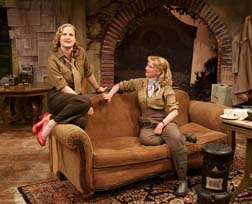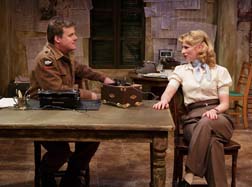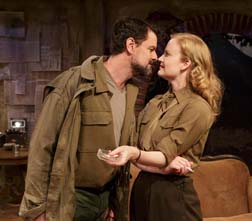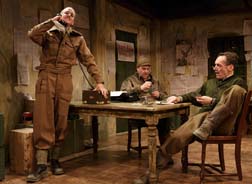By Lucy Komisar

This witty, pointed, clever play, which opened on Broadway in 1947, was written by Martha Gellhorn, ex-wife of Ernest Hemingway, and by Virginia Cowles. Both were journalists who had met covering the Spanish Civil War and then chronicled the Nazi assaults in Europe and North Africa. Their alter-egos, Jane Mason (Angela Pierce) and Annabelle Jones (Heidi Armbruster) have arrived at an Allied press camp near Naples in February 1944 to cover the campaign against German forces in Italy.
The production is a terrific feminist romp as the two very smart, ambitious women, as well as a singer who arrives to entertain the troops, show themselves more adroit, more gutsy and also more ethical than their male peers. The mood and big band music reminds one of a forties movie. The three are blonde and glamorous like the tough women who filled the screens in those days. Pierce and Armbruster, both charmers, are in the tradition of Katherine Hepburn, and Margot White is good as the shrill Daphne Rutherford, the visiting singer, who turns out to be smarter than she seems. Jerry Ruiz‘s fluid direction is filmic as well.

The fun part is cataloging the Hemingway traits ascribed to the various male characters. The play is just this side of camp.
Major Philip Brooke-Jervaux (the fine Bradford Cover), the stodgy British public relations officer, wooing Jane, a reporter for the New York Bulletin, tells her how wonderful it will be when they are married and they can ride, hunt, fish and get up before dawn to wait in lake-side blinds to shoot ducks. He is a caricature of a male chauvinist. When Jane demurs about some of his plans and indicates what she wants to do, he declares, “You‘re mine now!” And, “You don‘t have to think of anything!” Or, “She‘s a dreadful woman. All she can think about is her silly career.” Jane, of course, is the ultimate sophisticate. When he tells her that he lives in Yorkshire, in the country, she nods at the word country, “I love the Riviera.”

Annabelle Jones of the San Francisco World has to deal with ex-husband Joe Rogers (Rob Breckenridge) of the competitive San Francisco Dispatch. In the past, he has stolen her stories, and now while pledging undying love and pleading for reconciliation, he cheats her out of covering a scoop by not passing on a crucial letter and taking the plane seat she had been granted. Hemingway did something comparable, though on a much larger scale, by acing Gellhorn out of her position as European war correspondent for the magazine Collier‘s. Breckenridge is good as the irascible Rogers.
Most of the action occurs in the major‘s office with a brown sofa that could have been scrounged from a nearby villa, newspaper clips tacked to the wall, a wooden desk and table, and a few chairs where some correspondents pound out stories on portable typewriters. There‘s a room where the women have set up on camp beds. The evocative sets are by Steven C. Kemp.

David Graham Jones plays a stiff British correspondent who appears to do real work, but several of the American reporters never go out to get stories, just hang around the major’s office, play cards, go to press conferences, and crib from what more enterprising journalists do. Hemingway was known for hanging around bars to cover the wars he wrote about.
My only criticism: it seemed out of place for female correspondents in this war zone to occasionally wear high-heeled pumps around the press camp.
The play was a smash in London‘s West End, but lasted only four days on Broadway. The male critics must have taken it too much to heart.
Hard to believe this play hasn‘t been seen in New York for 65 years! The excellent Mint Theater Company revival was long overdue.
“Love Goes to Press.” Written by Martha Gellhorn & Virginia Cowles; directed by Jerry Ruiz. Mint Theater Company, 311 West 43rd Street, New York City. 866-811-4111. Opened June 18, 2012; closes July 29, 2012. Review on NY Theatre-Wire site.


So glad you liked the play and our production!
As one of the two dramaturges for Love Goes to Press at the Mint, I thought you might like to know that both Gellhorn and Cowles were known for wearing “inappropriate” fashion during their war-reporting assignments, and Cowles in particular for wearing dainty high-heeled shoes even in war zones. Like every other detail in the play, it is backed by genuine history and their personal experience of the war. Only the romantic-comedy plot is fiction. So, improbable as it seems, the high-heeled pumps in the press camp are the real deal!
LK: Thanks for the correction. Fascinating. This reflects a sort of pre-modern feminism where even tough war correspondents thought they needed to look glamorous! But traipsing around mud and dirt at a military camp in high heels? I think we have advanced!
Would that feminists would want to still look glamorous. Should not be mutually exclusive. Would help their cause, I’d say.
LK: Looking good, John, yes. As best you can. But can you imagine wearing high heels while covering the battlefields in Afghanistan?
I think this was something they did for themselves, not for others, LK. Not all female war correspondents did the same.
JC: you have a strangely limited idea of what feminism encompasses. Many glamorous women are feminists. As Rebecca West said, “Feminism is the radical notion that women are people.” It doesn’t require the giving up of one’s individuality, nor indeed a personal interest in fashion, cooking, homemaking, or anything else once associated primarily with women in earlier eras. All it requires is the recognition that women are not and should not be *limited* to those interests and spheres.